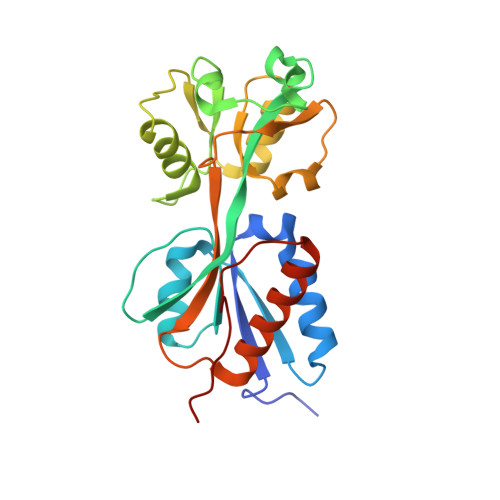Distinct Effector-binding Sites Enable Synergistic Transcriptional Activation by BenM, a LysR-type Regulator.
Ezezika, O.C., Haddad, S., Clark, T.J., Neidle, E.L., Momany, C.(2007) J Mol Biol 367: 616-629
- PubMed: 17291527
- DOI: https://doi.org/10.1016/j.jmb.2006.09.090
- Primary Citation of Related Structures:
2F6G, 2F6P, 2F78, 2F7A, 2F7B, 2F7C - PubMed Abstract:
BenM, a bacterial transcriptional regulator, responds synergistically to two effectors, benzoate and cis,cis-muconate. CatM, a paralog with overlapping function, responds only to muconate. Structures of their effector-binding domains revealed two effector-binding sites in BenM. BenM and CatM are the first LysR-type regulators to be structurally characterized while bound with physiologically relevant exogenous inducers. The effector complexes were obtained by soaking crystals with stabilizing solutions containing high effector concentrations and minimal amounts of competing ions. This strategy, including data collection with fragments of fractured crystals, may be generally applicable to related proteins. In BenM and CatM, the binding of muconate to an interdomain pocket was facilitated by helix dipoles that provide charge stabilization. In BenM, benzoate also bound in an adjacent hydrophobic region where it alters the effect of muconate bound in the primary site. A charge relay system within the BenM protein appears to underlie synergistic transcriptional activation. According to this model, Glu162 is a pivotal residue that forms salt-bridges with different arginine residues depending on the occupancy of the secondary effector-binding site. Glu162 interacts with Arg160 in the absence of benzoate and with Arg146 when benzoate is bound. This latter interaction enhances the negative charge of muconate bound to the adjacent primary effector-binding site. The redistribution of the electrostatic potential draws two domains of the protein more closely towards muconate, with the movement mediated by the dipole moments of four alpha helices. Therefore, with both effectors, BenM achieves a unique conformation capable of high level transcriptional activation.
Organizational Affiliation:
Department of Microbiology, University of Georgia, Athens, GA 30602-2605, USA.


















